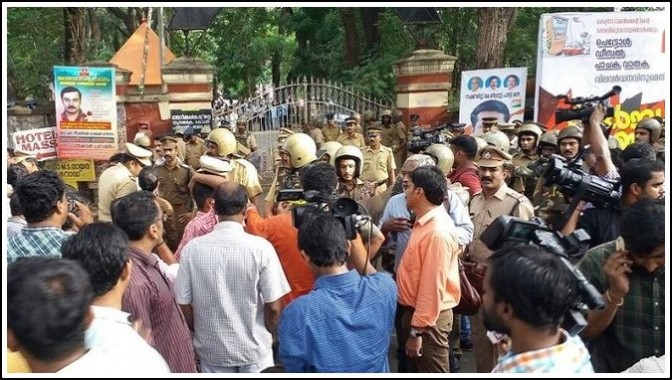Media still under attack in Kerala
Kerala journalists covering the courts are undergoing a strange chain of experiences as a section of lawyers and even police behave in a hostile manner. The government and the judiciary have failed to stop these attacks and protect their right to report without fear or interference.
It all began on July 19 when some lawyers physically attacked the media outside the Kerala High Court complex in Kochi. The reason was that lawyers were angry over the media coverage of a sexual molestation case in which an advocate, who was also a state government law officer, was named as the accused.
The next day, journalists were attacked again, this time even women journalists were reported to have faced the wrath of angry advocates. Some reporters were forcefully evicted from the media room inside the High Court complex and the room was, and still is, locked up.
On July 21, the state witnessed the third attack on the media, this time in the state capital Thiruvananthapuram. Six journalists and an advocate clerk suffered injuries in the attacks that took place outside the Thiruvananthapuram District Court complex. Lawyers pelted stones and beer bottles at journalists and damaged vehicles and journalists’ cameras. Before the physical attack, reporters had seen posters abusing journalists outside the media room and on some media vehicles. “No entry for Fourth Gender”, the poster read, in an abusive reference to the media’s status as the Fourth Estate in a democracy.
On July 26, in a related development, the Kerala High Court reportedly imposed restrictions on the media. The Times of India reported that the Court informed the reporters covering the court that “they should temporarily stop accessing judgments from the chambers of judges”. The reporters cried foul as they depend heavily on the chambers to both access the judgments and verify the details they receive from other sources.
There was more trouble in store a few days later. On July 30, more than a week after the attacks in Kochi and Thiruvananthapuram, journalists faced fresh trouble at a court, this time in Kozhikode. And the perpetrators this time were the police who allegedly manhandled and locked up some media persons inside a police station after picking them up from a local court in the city. Sub-inspector P.M. Vimod, who reportedly headed the assault on the journalists, was later suspended.
It was later claimed that the police misbehaved the journalists using as an excuse a court direction to increase the security on the court premises in view of a Maoist leader being produced at the court. .However, there have been some alternative explanations for the reason behind the advocate-journalist stand-off in Kochi, where the first attack was reported. According to a report published in the Kochi Post, the reason behind the clashes was a misleading” story in Deccan Chronicle and the reporter’s unwillingness to “correct” it.
Global media bodies respond
Global media groups including the International Press Institute, the Committee to Protect Journalists and Reporters Without Borders have taken notice of the developments and responded.
The International Press Institute called for “journalists to be allowed to report on court proceedings without interference.” “Violence against journalists is always unacceptable, but this latest incident, coming as it does within the premises of a court, is particularly worrying,” said Steven M. Ellis, the group’s Director of Advocacy and Communications.
Reporters Without Borders, condemning the Kerala High Court's decision to impose restrictions on media access, said "Violence against media professionals is unacceptable. The fact that some of the physical assaults were perpetrated by legal practitioners, who normally have the highest respect for the laws, is indeed worrying. We call for a return to peaceful relation between the media, the Court and all its members. We also denounce the ban on the media to freely cover Court cases which bear an interest for the public as the issue of aggression against woman is a social issue of general interest. The government and the justice system of Kerala must respect the law fully," Asia-Pacific head Benjamin Ismail said in a statement.
Several journalists took to social media and responded, often with anger, to the developments.
“Can’t the ‘problem’ that the advocates and police have be solved with two weeks of a media blackout of court proceedings?”,wrote Rasheedudheen.
“[We] don’t want media freedom. Neither the rights that the fourth estate is said to have. But the citizen’s right to practise his job should be protected”, wrote Jojo Joseph, criticizing the Chief Minister for his “silence” over the attacks.
Salim Hayder called for fellow journalists to stay away from the courts, and any other hostile places for that matter, as “reporters are not starving without news stories”.
In her Facebook post, Manila C. Mohan wrote in detail why the “special privileges” that the journalists are said to enjoy are not just for the journalists alone, but for the public at large. She was responding to the criticism from some corners that journalists are crying foul because they are losing the “special privileges” they enjoy in the courts. “It’s with the same privilege with which war, press conferences, communal riots, popular movements, corruption stories, survival stories, people’s demands, and the rights that are denied, are reported,” she wrote.
Muhammed Sabith is a journalist and can be reached at sabith.muhemmad@gmail.com
